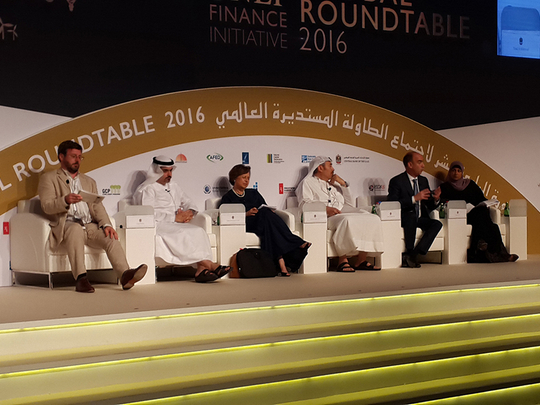
DUBAI: Ethical business practices such as those espoused by Islamic financing lie at the heart of sustainability, experts said on Tuesday.
A panel discussion on sustainable Islamic finance was told that most Islamic institutions were under increasing pressure to integrate environmental impact and sustainability into their decision-making process.
Yet the panel of Islamic bankers and investors at the UNEP Finance Initiative Global Roundtable 2016, held at the Grand Hyatt Hotel in Dubai, highlighted the advantages of the ethical approach.
“Profit maximisation and short-term results have driven a lot of economic activity in the world, and we are in a difficult spot because of that,” said Tirad Al Mahmoud, CEO of Abu Dhabi Islamic Bank.
He added: “I think ethics themselves are the answer to everything that we do. They will improve sustainability. If you bring ethical processes into business then short-term profitability becomes challenged.”
Al Mahmoud said financial regulators often failed to properly apply incentives and disincentives, and suggested ethical investments could be rewarded by discounts on capital.
“There’s nothing wrong with profitability,” he said. “That’s how the economy runs, and we love capital and we don’t like to pay tax. That’s fine.”
Sharia-compliant assets, which totalled $2 trillion worldwide at the end of 2015, are expected to exceed $3.2 trillion by 2020.
Al Mahmoud said much of the drive for sustainability was coming from young people and women.
“The young people around the world — it doesn’t matter what religion they are, it doesn’t matter what colour they are — they are the biggest supporters of ethics,” he said. “Women ... are big fans of the environment, of ethical practices in business.”
Panellists highlighted several issues when asked by panel moderator Hugh Weelan for their tweet-length ideas on how to improve the sector.
Dr Zeti Akhtar Aziz, former head governor of the Bank Negara Malaysia, said saleability was one of the major challenges facing Islamic financing. Al Mahmoud agreed, noting that Islamic institutions predominantly provides bespoke financing, which was difficult to ‘industrialise’.
Panellist Nida Raza, Director of Advisory Services at the Islamic Centre for Development of the Private Sector, said she believed Islamic finance bodies must become more inclusive.
Omar Selim, CEO of Arabesque UK, said Islamic institutions must become more transparent in their decision-making process.
Abdullah Mohammad Al Awar, CEO of Dubai Islamic Economy Development Centre, said he wanted to see greater use of public-private partnerships.












